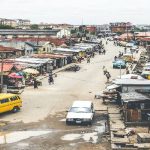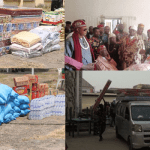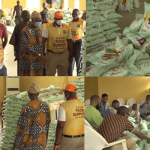In its determination to alleviate poverty among member states, the Economic Community of West African States (ECOWAS) Commission has donated 3,999 tonnes of grains to the Federal Government with a commitment to salvage over 7 million people currently facing food crisis in the country.
Already, the commission has set up a harmonised framework on identifying Risk Areas, and an estimated 7,087,102 people are currently in difficult food situations in the country, including Internally Displaced Persons (IDPs) and children affected by malnutrition.
The donation was targeted to prevent, mitigate, and provide durable solutions to complex emergencies and their effects, including natural and man-made disasters in the region.
Presenting the food items to the Nigerian government in Kano at the weekend, ECOWAS Commissioner for Agriculture, Water Resources, and Environment, Mr. Sangare Sekou, stressed that the commission was concerned with the upsurge in security and humanitarian crises coupled with the COVID-19 pandemic.
Mr. Sekou added that ECOWAS is committed to upholding the integration and solidarity with all member states and essentially Nigeria, which occupies one strategic position and economic viability in the West African sub-region.
He added that the gesture was meant to complement ECOWAS Disaster Risk Reduction Policy which focuses on disaster risk reduction through the design at reducing risks as an obstacle to development.
According to him, “the COVID-19 pandemic cuts across all sectors and disrupts production, warehousing, marketing, processing, and distribution systems of agricultural and food products, especially in the North-Eastern part of the country.
Receiving the donation on behalf of the Federal Government, Minister for Humanitarian, Disasters Management and Social Affairs, Sadia Faruq, applauded the gesture, which, she stressed, would further strengthen the commission’s regional integration and solidarity.
The minister emphasized that ECOWAS donation would complement the government palliative programs initiated to ease the effect of challenges and COVID-19 pandemic.
She revealed that the Federal Government had distributed 70,000 metric tonnes of grains to the poorest and vulnerable households across the country in the last four months, apart from millions of Nigerians who benefited from the Conditional Cash Transfer.
The food donated included millet and sorghum. The first donation included 1,196 tonnes of cereals financed by the ECOWAS Commission’s Humanitarian Emergency Fund for Disaster and Emergency Relief to the Member States affected by humanitarian crises, while the second donation of 2,803 tonnes was funded by the resources of the Regional Food Security Storage Support Project, which the European Union is financing for a total amount of €56 million.
Established on February 28, 2013, in Yamoussoukro, Côte d’Ivoire, by the ECOWAS Heads of State and Government, the Regional Food Security Reserve aims to complement the efforts of member states to provide diversified rapid food and nutritional assistance.
In its determination to alleviate poverty among member states, the Economic Community of West African States (ECOWAS) Commission has donated 3,999 tonnes of grains to the Federal Government with a commitment to salvage over 7 million people currently facing food crisis in the country.
Already, the commission has set up a harmonised framework on identifying Risk Areas, and an estimated 7,087,102 people are currently in difficult food situations in the country, including Internally Displaced Persons (IDPs) and children affected by malnutrition.
The donation was targeted to prevent, mitigate, and provide durable solutions to complex emergencies and their effects, including natural and man-made disasters in the region.
Presenting the food items to the Nigerian government in Kano at the weekend, ECOWAS Commissioner for Agriculture, Water Resources, and Environment, Mr. Sangare Sekou, stressed that the commission was concerned with the upsurge in security and humanitarian crises coupled with the COVID-19 pandemic.
Mr. Sekou added that ECOWAS is committed to upholding the integration and solidarity with all member states and essentially Nigeria, which occupies one strategic position and economic viability in the West African sub-region.
He added that the gesture was meant to complement ECOWAS Disaster Risk Reduction Policy which focuses on disaster risk reduction through the design at reducing risks as an obstacle to development.
According to him, “the COVID-19 pandemic cuts across all sectors and disrupts production, warehousing, marketing, processing, and distribution systems of agricultural and food products, especially in the North-Eastern part of the country.
Receiving the donation on behalf of the Federal Government, Minister for Humanitarian, Disasters Management and Social Affairs, Sadia Faruq, applauded the gesture, which, she stressed, would further strengthen the commission’s regional integration and solidarity.
The minister emphasized that ECOWAS donation would complement the government palliative programs initiated to ease the effect of challenges and COVID-19 pandemic.
She revealed that the Federal Government had distributed 70,000 metric tonnes of grains to the poorest and vulnerable households across the country in the last four months, apart from millions of Nigerians who benefited from the Conditional Cash Transfer.
The food donated included millet and sorghum. The first donation included 1,196 tonnes of cereals financed by the ECOWAS Commission’s Humanitarian Emergency Fund for Disaster and Emergency Relief to the Member States affected by humanitarian crises, while the second donation of 2,803 tonnes was funded by the resources of the Regional Food Security Storage Support Project, which the European Union is financing for a total amount of €56 million.
Established on February 28, 2013, in Yamoussoukro, Côte d’Ivoire, by the ECOWAS Heads of State and Government, the Regional Food Security Reserve aims to complement the efforts of member states to provide diversified rapid food and nutritional assistance.
In its determination to alleviate poverty among member states, the Economic Community of West African States (ECOWAS) Commission has donated 3,999 tonnes of grains to the Federal Government with a commitment to salvage over 7 million people currently facing food crisis in the country.
Already, the commission has set up a harmonised framework on identifying Risk Areas, and an estimated 7,087,102 people are currently in difficult food situations in the country, including Internally Displaced Persons (IDPs) and children affected by malnutrition.
The donation was targeted to prevent, mitigate, and provide durable solutions to complex emergencies and their effects, including natural and man-made disasters in the region.
Presenting the food items to the Nigerian government in Kano at the weekend, ECOWAS Commissioner for Agriculture, Water Resources, and Environment, Mr. Sangare Sekou, stressed that the commission was concerned with the upsurge in security and humanitarian crises coupled with the COVID-19 pandemic.
Mr. Sekou added that ECOWAS is committed to upholding the integration and solidarity with all member states and essentially Nigeria, which occupies one strategic position and economic viability in the West African sub-region.
He added that the gesture was meant to complement ECOWAS Disaster Risk Reduction Policy which focuses on disaster risk reduction through the design at reducing risks as an obstacle to development.
According to him, “the COVID-19 pandemic cuts across all sectors and disrupts production, warehousing, marketing, processing, and distribution systems of agricultural and food products, especially in the North-Eastern part of the country.
Receiving the donation on behalf of the Federal Government, Minister for Humanitarian, Disasters Management and Social Affairs, Sadia Faruq, applauded the gesture, which, she stressed, would further strengthen the commission’s regional integration and solidarity.
The minister emphasized that ECOWAS donation would complement the government palliative programs initiated to ease the effect of challenges and COVID-19 pandemic.
She revealed that the Federal Government had distributed 70,000 metric tonnes of grains to the poorest and vulnerable households across the country in the last four months, apart from millions of Nigerians who benefited from the Conditional Cash Transfer.
The food donated included millet and sorghum. The first donation included 1,196 tonnes of cereals financed by the ECOWAS Commission’s Humanitarian Emergency Fund for Disaster and Emergency Relief to the Member States affected by humanitarian crises, while the second donation of 2,803 tonnes was funded by the resources of the Regional Food Security Storage Support Project, which the European Union is financing for a total amount of €56 million.
Established on February 28, 2013, in Yamoussoukro, Côte d’Ivoire, by the ECOWAS Heads of State and Government, the Regional Food Security Reserve aims to complement the efforts of member states to provide diversified rapid food and nutritional assistance.
In its determination to alleviate poverty among member states, the Economic Community of West African States (ECOWAS) Commission has donated 3,999 tonnes of grains to the Federal Government with a commitment to salvage over 7 million people currently facing food crisis in the country.
Already, the commission has set up a harmonised framework on identifying Risk Areas, and an estimated 7,087,102 people are currently in difficult food situations in the country, including Internally Displaced Persons (IDPs) and children affected by malnutrition.
The donation was targeted to prevent, mitigate, and provide durable solutions to complex emergencies and their effects, including natural and man-made disasters in the region.
Presenting the food items to the Nigerian government in Kano at the weekend, ECOWAS Commissioner for Agriculture, Water Resources, and Environment, Mr. Sangare Sekou, stressed that the commission was concerned with the upsurge in security and humanitarian crises coupled with the COVID-19 pandemic.
Mr. Sekou added that ECOWAS is committed to upholding the integration and solidarity with all member states and essentially Nigeria, which occupies one strategic position and economic viability in the West African sub-region.
He added that the gesture was meant to complement ECOWAS Disaster Risk Reduction Policy which focuses on disaster risk reduction through the design at reducing risks as an obstacle to development.
According to him, “the COVID-19 pandemic cuts across all sectors and disrupts production, warehousing, marketing, processing, and distribution systems of agricultural and food products, especially in the North-Eastern part of the country.
Receiving the donation on behalf of the Federal Government, Minister for Humanitarian, Disasters Management and Social Affairs, Sadia Faruq, applauded the gesture, which, she stressed, would further strengthen the commission’s regional integration and solidarity.
The minister emphasized that ECOWAS donation would complement the government palliative programs initiated to ease the effect of challenges and COVID-19 pandemic.
She revealed that the Federal Government had distributed 70,000 metric tonnes of grains to the poorest and vulnerable households across the country in the last four months, apart from millions of Nigerians who benefited from the Conditional Cash Transfer.
The food donated included millet and sorghum. The first donation included 1,196 tonnes of cereals financed by the ECOWAS Commission’s Humanitarian Emergency Fund for Disaster and Emergency Relief to the Member States affected by humanitarian crises, while the second donation of 2,803 tonnes was funded by the resources of the Regional Food Security Storage Support Project, which the European Union is financing for a total amount of €56 million.
Established on February 28, 2013, in Yamoussoukro, Côte d’Ivoire, by the ECOWAS Heads of State and Government, the Regional Food Security Reserve aims to complement the efforts of member states to provide diversified rapid food and nutritional assistance.
In its determination to alleviate poverty among member states, the Economic Community of West African States (ECOWAS) Commission has donated 3,999 tonnes of grains to the Federal Government with a commitment to salvage over 7 million people currently facing food crisis in the country.
Already, the commission has set up a harmonised framework on identifying Risk Areas, and an estimated 7,087,102 people are currently in difficult food situations in the country, including Internally Displaced Persons (IDPs) and children affected by malnutrition.
The donation was targeted to prevent, mitigate, and provide durable solutions to complex emergencies and their effects, including natural and man-made disasters in the region.
Presenting the food items to the Nigerian government in Kano at the weekend, ECOWAS Commissioner for Agriculture, Water Resources, and Environment, Mr. Sangare Sekou, stressed that the commission was concerned with the upsurge in security and humanitarian crises coupled with the COVID-19 pandemic.
Mr. Sekou added that ECOWAS is committed to upholding the integration and solidarity with all member states and essentially Nigeria, which occupies one strategic position and economic viability in the West African sub-region.
He added that the gesture was meant to complement ECOWAS Disaster Risk Reduction Policy which focuses on disaster risk reduction through the design at reducing risks as an obstacle to development.
According to him, “the COVID-19 pandemic cuts across all sectors and disrupts production, warehousing, marketing, processing, and distribution systems of agricultural and food products, especially in the North-Eastern part of the country.
Receiving the donation on behalf of the Federal Government, Minister for Humanitarian, Disasters Management and Social Affairs, Sadia Faruq, applauded the gesture, which, she stressed, would further strengthen the commission’s regional integration and solidarity.
The minister emphasized that ECOWAS donation would complement the government palliative programs initiated to ease the effect of challenges and COVID-19 pandemic.
She revealed that the Federal Government had distributed 70,000 metric tonnes of grains to the poorest and vulnerable households across the country in the last four months, apart from millions of Nigerians who benefited from the Conditional Cash Transfer.
The food donated included millet and sorghum. The first donation included 1,196 tonnes of cereals financed by the ECOWAS Commission’s Humanitarian Emergency Fund for Disaster and Emergency Relief to the Member States affected by humanitarian crises, while the second donation of 2,803 tonnes was funded by the resources of the Regional Food Security Storage Support Project, which the European Union is financing for a total amount of €56 million.
Established on February 28, 2013, in Yamoussoukro, Côte d’Ivoire, by the ECOWAS Heads of State and Government, the Regional Food Security Reserve aims to complement the efforts of member states to provide diversified rapid food and nutritional assistance.
In its determination to alleviate poverty among member states, the Economic Community of West African States (ECOWAS) Commission has donated 3,999 tonnes of grains to the Federal Government with a commitment to salvage over 7 million people currently facing food crisis in the country.
Already, the commission has set up a harmonised framework on identifying Risk Areas, and an estimated 7,087,102 people are currently in difficult food situations in the country, including Internally Displaced Persons (IDPs) and children affected by malnutrition.
The donation was targeted to prevent, mitigate, and provide durable solutions to complex emergencies and their effects, including natural and man-made disasters in the region.
Presenting the food items to the Nigerian government in Kano at the weekend, ECOWAS Commissioner for Agriculture, Water Resources, and Environment, Mr. Sangare Sekou, stressed that the commission was concerned with the upsurge in security and humanitarian crises coupled with the COVID-19 pandemic.
Mr. Sekou added that ECOWAS is committed to upholding the integration and solidarity with all member states and essentially Nigeria, which occupies one strategic position and economic viability in the West African sub-region.
He added that the gesture was meant to complement ECOWAS Disaster Risk Reduction Policy which focuses on disaster risk reduction through the design at reducing risks as an obstacle to development.
According to him, “the COVID-19 pandemic cuts across all sectors and disrupts production, warehousing, marketing, processing, and distribution systems of agricultural and food products, especially in the North-Eastern part of the country.
Receiving the donation on behalf of the Federal Government, Minister for Humanitarian, Disasters Management and Social Affairs, Sadia Faruq, applauded the gesture, which, she stressed, would further strengthen the commission’s regional integration and solidarity.
The minister emphasized that ECOWAS donation would complement the government palliative programs initiated to ease the effect of challenges and COVID-19 pandemic.
She revealed that the Federal Government had distributed 70,000 metric tonnes of grains to the poorest and vulnerable households across the country in the last four months, apart from millions of Nigerians who benefited from the Conditional Cash Transfer.
The food donated included millet and sorghum. The first donation included 1,196 tonnes of cereals financed by the ECOWAS Commission’s Humanitarian Emergency Fund for Disaster and Emergency Relief to the Member States affected by humanitarian crises, while the second donation of 2,803 tonnes was funded by the resources of the Regional Food Security Storage Support Project, which the European Union is financing for a total amount of €56 million.
Established on February 28, 2013, in Yamoussoukro, Côte d’Ivoire, by the ECOWAS Heads of State and Government, the Regional Food Security Reserve aims to complement the efforts of member states to provide diversified rapid food and nutritional assistance.
In its determination to alleviate poverty among member states, the Economic Community of West African States (ECOWAS) Commission has donated 3,999 tonnes of grains to the Federal Government with a commitment to salvage over 7 million people currently facing food crisis in the country.
Already, the commission has set up a harmonised framework on identifying Risk Areas, and an estimated 7,087,102 people are currently in difficult food situations in the country, including Internally Displaced Persons (IDPs) and children affected by malnutrition.
The donation was targeted to prevent, mitigate, and provide durable solutions to complex emergencies and their effects, including natural and man-made disasters in the region.
Presenting the food items to the Nigerian government in Kano at the weekend, ECOWAS Commissioner for Agriculture, Water Resources, and Environment, Mr. Sangare Sekou, stressed that the commission was concerned with the upsurge in security and humanitarian crises coupled with the COVID-19 pandemic.
Mr. Sekou added that ECOWAS is committed to upholding the integration and solidarity with all member states and essentially Nigeria, which occupies one strategic position and economic viability in the West African sub-region.
He added that the gesture was meant to complement ECOWAS Disaster Risk Reduction Policy which focuses on disaster risk reduction through the design at reducing risks as an obstacle to development.
According to him, “the COVID-19 pandemic cuts across all sectors and disrupts production, warehousing, marketing, processing, and distribution systems of agricultural and food products, especially in the North-Eastern part of the country.
Receiving the donation on behalf of the Federal Government, Minister for Humanitarian, Disasters Management and Social Affairs, Sadia Faruq, applauded the gesture, which, she stressed, would further strengthen the commission’s regional integration and solidarity.
The minister emphasized that ECOWAS donation would complement the government palliative programs initiated to ease the effect of challenges and COVID-19 pandemic.
She revealed that the Federal Government had distributed 70,000 metric tonnes of grains to the poorest and vulnerable households across the country in the last four months, apart from millions of Nigerians who benefited from the Conditional Cash Transfer.
The food donated included millet and sorghum. The first donation included 1,196 tonnes of cereals financed by the ECOWAS Commission’s Humanitarian Emergency Fund for Disaster and Emergency Relief to the Member States affected by humanitarian crises, while the second donation of 2,803 tonnes was funded by the resources of the Regional Food Security Storage Support Project, which the European Union is financing for a total amount of €56 million.
Established on February 28, 2013, in Yamoussoukro, Côte d’Ivoire, by the ECOWAS Heads of State and Government, the Regional Food Security Reserve aims to complement the efforts of member states to provide diversified rapid food and nutritional assistance.
In its determination to alleviate poverty among member states, the Economic Community of West African States (ECOWAS) Commission has donated 3,999 tonnes of grains to the Federal Government with a commitment to salvage over 7 million people currently facing food crisis in the country.
Already, the commission has set up a harmonised framework on identifying Risk Areas, and an estimated 7,087,102 people are currently in difficult food situations in the country, including Internally Displaced Persons (IDPs) and children affected by malnutrition.
The donation was targeted to prevent, mitigate, and provide durable solutions to complex emergencies and their effects, including natural and man-made disasters in the region.
Presenting the food items to the Nigerian government in Kano at the weekend, ECOWAS Commissioner for Agriculture, Water Resources, and Environment, Mr. Sangare Sekou, stressed that the commission was concerned with the upsurge in security and humanitarian crises coupled with the COVID-19 pandemic.
Mr. Sekou added that ECOWAS is committed to upholding the integration and solidarity with all member states and essentially Nigeria, which occupies one strategic position and economic viability in the West African sub-region.
He added that the gesture was meant to complement ECOWAS Disaster Risk Reduction Policy which focuses on disaster risk reduction through the design at reducing risks as an obstacle to development.
According to him, “the COVID-19 pandemic cuts across all sectors and disrupts production, warehousing, marketing, processing, and distribution systems of agricultural and food products, especially in the North-Eastern part of the country.
Receiving the donation on behalf of the Federal Government, Minister for Humanitarian, Disasters Management and Social Affairs, Sadia Faruq, applauded the gesture, which, she stressed, would further strengthen the commission’s regional integration and solidarity.
The minister emphasized that ECOWAS donation would complement the government palliative programs initiated to ease the effect of challenges and COVID-19 pandemic.
She revealed that the Federal Government had distributed 70,000 metric tonnes of grains to the poorest and vulnerable households across the country in the last four months, apart from millions of Nigerians who benefited from the Conditional Cash Transfer.
The food donated included millet and sorghum. The first donation included 1,196 tonnes of cereals financed by the ECOWAS Commission’s Humanitarian Emergency Fund for Disaster and Emergency Relief to the Member States affected by humanitarian crises, while the second donation of 2,803 tonnes was funded by the resources of the Regional Food Security Storage Support Project, which the European Union is financing for a total amount of €56 million.
Established on February 28, 2013, in Yamoussoukro, Côte d’Ivoire, by the ECOWAS Heads of State and Government, the Regional Food Security Reserve aims to complement the efforts of member states to provide diversified rapid food and nutritional assistance.














